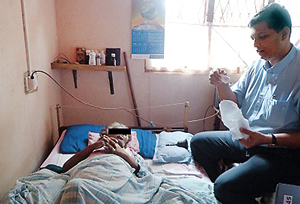Give Rs. 5 a day to help relieve their pain
It is devastating to be diagnosed with cancer. To be financially poor and diagnosed with cancer is to enter a particular kind of living hell. “A child diagnosed with leukemia has a very good chance of going into remission,” says Dr. Samadhi Rajapaksa.
“If we get two or three vials of Neupogen we can build up his system to withstand the chemo. But a vial of Neupogen, costs around Rs. 6000. How many parents who bring their children to the government hospitals can afford three shots of Neupogen? Most of the families can’t even afford one. If the hospital doesn’t have the drug, they have to watch their child suffer,” he continues.

At the hospice in Kurundankulama, Anuradhapura: A nurse tends a cancer patient
Dr. Rajapaksa sees patients like this every day as he counsels children and adults who come to the National Cancer Institute in Maharagama, known to the general public as the Cancer Hospital, where he works as a medical officer in charge of the counselling unit.
The moment a person receives a diagnosis of cancer in Sri Lanka, that person is thrown to the edge of a chasm. The patient stares at the face of death. And it is a face that can change its features drastically, depending on the financial status of the patient.
The diagnosis of cancer in a child or an adult, who doesn’t have a substantial private income or savings, in Sri Lanka will guarantee one thing. The next few years will be marked by unimaginable emotional and physical suffering for the patient and the family, a thousand times more than that of someone who can afford to purchase medication and treatment privately.
The government is doing the maximum within its means to offer the best possible treatment and medication free of charge to anyone who walks through one of its hospital doorways, a fact we need to underscore and appreciate, given that even the country with the world’s largest economy, the US, would rather stint on its budget than offer free health care to even some of its citizens. The government spends on average Rs. 9 million on one single breast cancer patient. However, nearly a 1000 patients visit the Maharagama cancer hospital every day, leave alone the other regional centres. Their chances of survival depend on the drugs they receive.
The state medical system tries to give patients all the medication they need. “But we sometimes have to ask patients to purchase some of the drugs from private pharmacies,” Dr. Rajapaksa continues. “We know what suffering they go through. Most don’t even have the bus fare to come to Maharagama. We are also helpless.”
Take, for instance, medication for pain. Pain is a hallmark of cancer, and chances are, most patients will battle debilitating pain at some stage of the disease. Yet, the cost of pain medication for one hour is only five rupees.

Home visit:Dr. Rajapaksa by a patient’s bedside
Or, take nursing and care. A stage four cancer patient, that is someone at the terminal stages of the disease, needs constant care. Palliative care, that is care for the terminally ill or those with a life limiting disease, while best managed at home, is difficult if the patient needs professional medical supervision. Few families in Sri Lanka can afford to pay for private visits by doctors and nurses to administer intravenous pain killers or other stabilizing medication to a terminally ill family member. This is leaving aside the enormous energy it takes from the care-givers to ensure a bed-ridden patient doesn’t develop bed sores and infections. Dr. Rajapaksa has completed a certified course in Kerala in pain and palliative medicine.
Yesterday, October 12 was the World Hospice and Palliative Care Day and Dr. Rajapaksa and his team launched a campaign to raise funds for pain medication from the Sri Lankan public at the Maharagama cancer hospital.
They asked for a donation of five rupees a day from anyone who could afford it. It adds up to only Rs. 150 a month. This is part of the ongoing work that Dr Rajapaksa has been doing through the Cancer Care Association (CCA). The CCA helps cancer patients with their financial and care needs.
“I found that I was spending from my salary to assist helpless patients buy their medication. So Upul Ekanayake, a Clinical Oncologist, and I started this charity when we were working in the Anuradhapura Hospital. I walked from Anuradhapura to Kandy and raised Rs. 3 lakhs. Now we have over Rs. 20 million worth of equipment and a 20-bed hospice in Anuradhapura,” Dr. Rajapaksa says.
However, equipment and buildings need to be backed by funds for medication and care-givers. “What we need is regular contributions to pay for the medication on a daily basis. So we are still putting in personal funds,” Dr. Rajapaksa adds. Since he doesn’t engage in private practice, Dr. Rajapaksa doesn’t receive the extra income that most other physicians can draw from for the personal financial assistance they could give patients.
To meet Dr. Rajapaksa is to meet a human who lives a life based on his spiritual beliefs. A practising Buddhist, who had started meditating at the age of 8, he had chosen medicine as a profession based on the Buddha’s teachings. “To care for the sick is to care for the Buddha,” he says. He refuses to charge his patients for this reason and accepts only the salary he gets as an employee of the state.
“Through this work I get the chance to practise kindness, metta and compassion. But most importantly, to practise equanimity. If I don’t practise equanimity, I wouldn’t be able to watch the suffering of cancer patients,” Dr. Rajapaksa says.
He adds, “The suffering I see every day is terrible.”
To help their cause, please see the Cancer Care Association website http://cancercaresl.com or contact- Dr. Samadhi Rajapaksa on 077 340 9787
comments powered by Disqus

